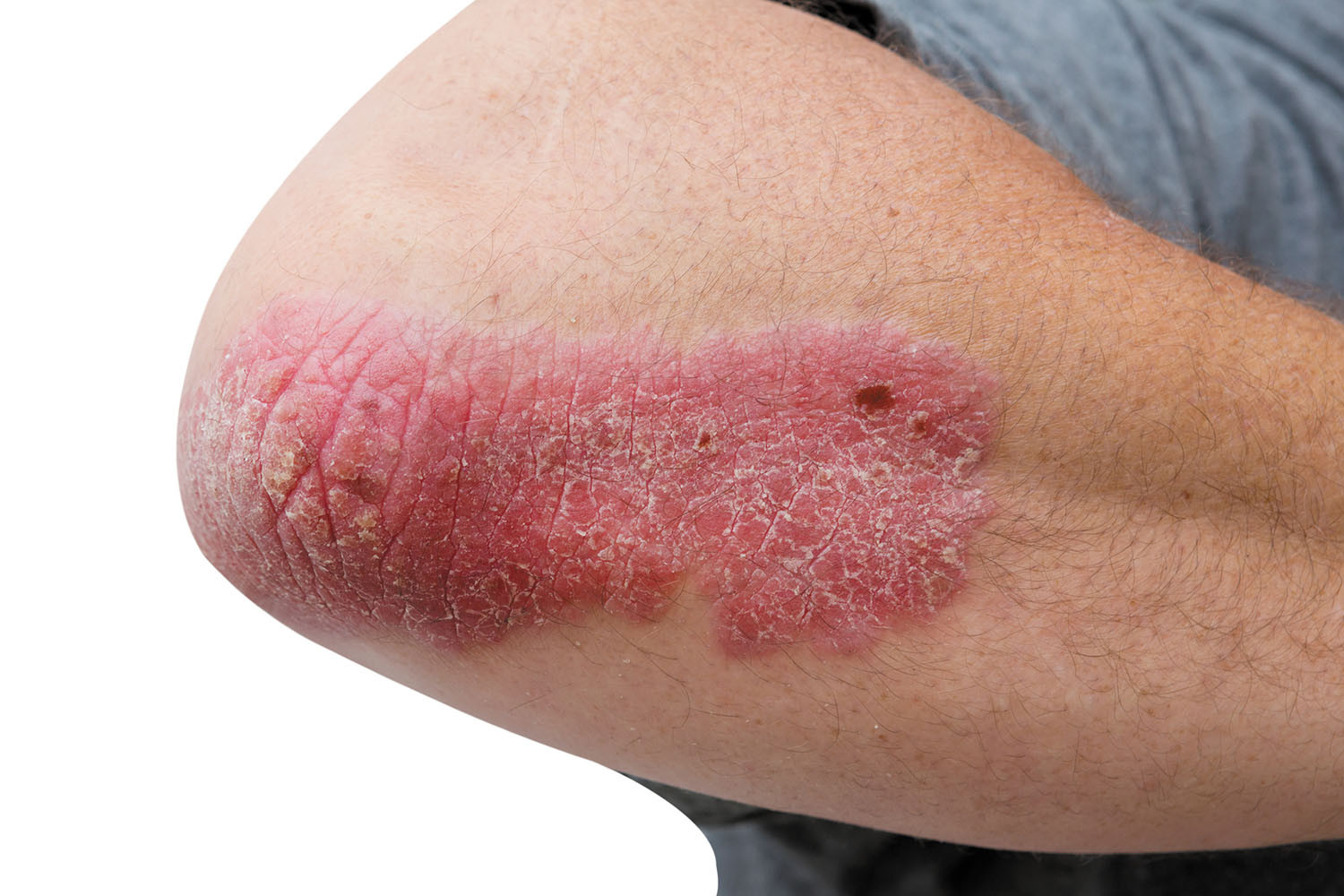A look at psoriasis
Medications and other standard therapies can help you manage this common skin condition.

Psoriasis is among the most common skin diseases, and once it shows up, it never entirely goes away. "Unfortunately, there is no cure for psoriasis," says Dr. Flavia Fedeles, a dermatologist with Harvard-affiliated Massachusetts General Hospital. "But you can take steps to reduce flare-ups and manage their severity when they do appear."
Causes and appearance
Psoriasis appears as reddish patches of skin covered with silvery scales. It can cause intense itchiness and pain. You might feel like you're being poked with needles or on fire. Breakouts can appear almost anywhere on the body, depending on which version of the condition you have (see "Know your psoriasis").
Psoriasis develops when the immune system prompts certain areas of your skin to produce new cells more rapidly than usual, which leads to thickening and scaling. It's not clear what makes this happen. The condition tends to go through cycles. Flare-ups can last weeks or even months, followed by remission for several months or even a year or longer. While psoriasis strikes more men than women, genetics are a more significant factor in who gets it. Most people with psoriasis have inherited one or more genes that affect the immune system in a way to make them prone to it.
Various types of stimuli can make the immune system go haywire and trigger flare-ups. The most common is stress, which causes the body to release chemicals that boost inflammation. Weight gain also contributes to outbreaks. Flare-ups can be a response to certain medications, like beta blockers used to control high blood pressure or heart rate, or lithium used to treat bipolar disorder. (If you think your flare-ups are related to your medication use, check with your doctor about changing drugs or adjusting dosage.)
Know your psoriasisPsoriasis comes in four main patterns: Plaque psoriasis, the most common type, is marked by patches on the trunk and limbs, especially the elbows and knees, and on the scalp. Fingernails and toenails may become thick and pitted and separate from their nail beds. Inverse psoriasis, a plaque type of psoriasis, tends to affect skin creases, such as those under the arm and around the groin and buttocks. The red patches may be moist rather than scaly. Pustular psoriasis is characterized by small pustules (bulging patches of skin filled with fluid) spread over the body. Guttate psoriasis causes many teardrop-sized patches that are more prominent on the body than the face. |
Current treatments
There are many psoriasis treatments available, which may be used alone or in combination. "Several factors go into the decision of which to use, including the body surface area affected, whether a person has psoriatic arthritis or other medical problems, and the potential risk of side effects," says Dr. Fedeles.
The goal of treatment is to reduce your psoriasis to no more than 1% of your body surface area (about equal to the top of your hand) within three months, according to the National Psoriasis Foundation.
"If you don't reach the 1% goal during this time frame, your doctor may have you continue treatment for an additional three months," says Dr. Fedeles. You and your doctor may choose to accept a less aggressive goal, such as 3% (or less) of your skin surface. If you still don't meet the target after six months, your doctor may explore other options, like increasing medication dosage or switching to another one.
Here are some of the common treatments your doctor may recommend:
Topical medications. These prescription and over-the-counter creams, ointments, and lotions are applied directly to the skin. People also should maintain a daily skin care regimen using lubricants like unscented moisturizers.
Phototherapy. Also called light therapy, this treats extensive or widespread psoriasis. Here, artificial ultraviolet B rays penetrate the skin to slow the growth of affected skin cells. The light intensity, duration of exposure, and number of treatments vary. It's common for psoriasis to initially worsen with this treatment before it improves.
Oral vitamin A derivatives. These medications treat moderate to severe psoriasis involving large areas of skin. They sometimes cause severe side effects, like hair loss; thin nails; dry mouth, eyes, and skin; bleeding gums; nosebleeds; headache; and joint or muscle pain.
Biologic therapy. These suppress the immune system. They come in pill or injection form and treat moderate to severe psoriasis or when a person has joint involvement (psoriatic arthritis). There are many FDA-approved drugs available and more in the pipeline.
Healthy habits. This includes maintaining a healthy weight, following a healthy diet, exercising regularly, and reducing stress. You should also give up smoking and limit alcohol consumption, as both can worsen psoriasis.
Image: © Jodi Jacobson/Getty Images
About the Author

Matthew Solan, Former Executive Editor, Harvard Men's Health Watch
Disclaimer:
As a service to our readers, Harvard Health Publishing provides access to our library of archived content. Please note the date of last review or update on all articles.
No content on this site, regardless of date, should ever be used as a substitute for direct medical advice from your doctor or other qualified clinician.













